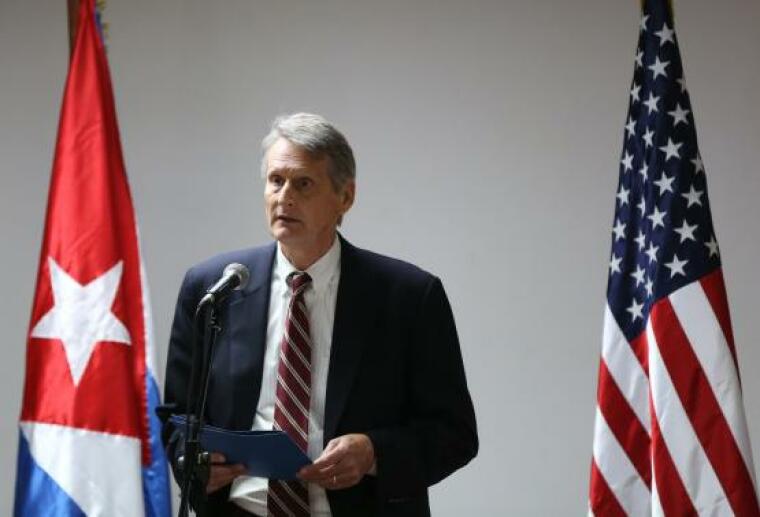Immigration News 2015: U.S., Cuba Remain At Odds Over Immigration Policy

American and Cuban officials remained deeply at odds over the exodus of Cubans to the United States during the first day of high-level talks in Havana on Wednesday.
Despite clashing over immigration policies, both sides claimed to have a productive and constructive meeting during the first day of the historic talks, which aimed to restore diplomatic ties between the two countries.
"The productive and collaborative nature of today's discussion proves that despite the clear differences that remain between our countries, the United States and Cuba can find opportunities to advance our mutually shared interests," U.S. Deputy Assistant Secretary of State for Western Hemisphere Affairs Alex Lee said after the talks.
Josefina Vidal, the head of the Cuban foreign ministry's U.S. Affairs Department, expressed hope that the talks would allow Cuba to have a normal relationship with the United States, especially in the area of migration.
The migration talks tackled an issue that has vexed both nations for years, with Cubans regularly hopping on flimsy boats just get to Florida.
Current U.S. policy gives Cubans, who set foot in the United States, quick access to permanent residency while those caught at sea are deported back home.
This has caused a surge of Cuban migrants, who apparently fear that the U.S.-Cuba negotiations will end this policy.
In 2014, the United States intercepted a total of 3,722 Cubans at sea, which was twice as much as the number recorded in 2012.
Lee said the Obama administration is "completely committed" to upholding the current rules, promising to continue granting safe haven to Cubans with special protections, which is usually denied to other nationalities.
Vidal slammed this U.S. migration policy, which she said violates a bilateral agreement to promote safe, legal, and orderly immigration. She also criticized the Cuban Medical Professional Parole Program for encouraging Cuban doctors and nurses to defect to the United States. "This is a policy which is totally inconsistent with the present bilateral context," she said, describing it as a "reprehensible brain drain practice."
The talks will resume again on Thursday to tackle the topic of restoring diplomatic relations, which both sides hope would pave the way for the discussion on full trade and travel ties.
The meetings are being held after U.S. President Barack Obama and Cuban President Raul Castro announced last Dec. 17 that they would work to restore diplomatic ties.
 Christians don't have to affirm transgenderism, but they can’t express that view at work: tribunal
Christians don't have to affirm transgenderism, but they can’t express that view at work: tribunal Archaeology discovery: Medieval Christian prayer beads found on Holy Island
Archaeology discovery: Medieval Christian prayer beads found on Holy Island Presbyterian Church in America votes to leave National Association of Evangelicals
Presbyterian Church in America votes to leave National Association of Evangelicals Over 50 killed in 'vile and satanic' attack at Nigerian church on Pentecost Sunday
Over 50 killed in 'vile and satanic' attack at Nigerian church on Pentecost Sunday Ukrainian Orthodox Church severs ties with Moscow over Patriarch Kirill's support for Putin's war
Ukrainian Orthodox Church severs ties with Moscow over Patriarch Kirill's support for Putin's war Islamic State kills 20 Nigerian Christians as revenge for US airstrike
Islamic State kills 20 Nigerian Christians as revenge for US airstrike Man who served 33 years in prison for murder leads inmates to Christ
Man who served 33 years in prison for murder leads inmates to Christ


 Nigerian student beaten to death, body burned over ‘blasphemous’ WhatsApp message
Nigerian student beaten to death, body burned over ‘blasphemous’ WhatsApp message 'A new low': World reacts after Hong Kong arrests 90-year-old Cardinal Joseph Zen
'A new low': World reacts after Hong Kong arrests 90-year-old Cardinal Joseph Zen Iran sentences Christian man to 10 years in prison for hosting house church worship gathering
Iran sentences Christian man to 10 years in prison for hosting house church worship gathering French Guyana: Pastor shot dead, church set on fire after meeting delegation of Evangelicals
French Guyana: Pastor shot dead, church set on fire after meeting delegation of Evangelicals ‘Talking Jesus’ report finds only 6% of UK adults identify as practicing Christians
‘Talking Jesus’ report finds only 6% of UK adults identify as practicing Christians Mission Eurasia ministry center blown up in Ukraine, hundreds of Bibles destroyed: 'God will provide'
Mission Eurasia ministry center blown up in Ukraine, hundreds of Bibles destroyed: 'God will provide' Church holds service for first time after ISIS desecrated it 8 years ago
Church holds service for first time after ISIS desecrated it 8 years ago Burger King apologizes for 'offensive campaign' using Jesus' words at the Last Supper
Burger King apologizes for 'offensive campaign' using Jesus' words at the Last Supper Uganda: Muslims abduct teacher, burn him inside mosque for praying in Christ’s name
Uganda: Muslims abduct teacher, burn him inside mosque for praying in Christ’s name